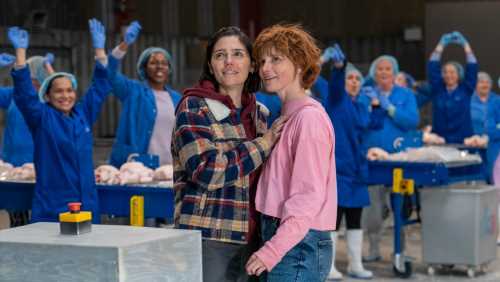
The importance of laughter during times of loss is often undervalued. With her feature directorial debut, Janis Pugh showcases the significance of friendship and humor when grief strikes. A musical rom-com drama, “Chuck Chuck Baby” underscores the power of female companionship through the ups and downs of life.
Premiering as part of the Edinburgh International Film Festival’s LGBTQ Stories section and also headed to Toronto Film Festival, “Chuck Chuck Baby” follows the life of Helen (Louise Brealey), a chicken factory worker in a small industrial town in northern Wales, whose life is mired in quotidian details, packaging chickens and caring for her ailing mother-figure Gwen. Helen’s life is turned upside down, however, with the unexpected arrival of her former high school love Joanne (Annabel Scholey), who inspires a renewed appreciation in Helen of her hometown, her life and herself. Yet, the couple’s reunion is quickly muddled. The death of Gwen leaves Helen deep in grief and Joanne’s abrupt departure further strains the couple’s love for each other, leaving their future hanging.
While Joanne and Helen’s relationship drives the plot of Pugh’s eclectic yet endearing tale, at the heart of the film is the importance of female camaraderie. Speaking to the representation of sisterhood across the story in the form of the relationships Helen has with her factory co-workers, Pugh tells Variety: “For me, it is very much in my blood and my soul to write about strong and humorous female characters, and how they deal with life’s hardships. Especially when we lose someone we love, there are friends who come to lift us up, and I have always envisioned these friends as the women I was surrounded by. And so although this is a love story, the love is not boxed in. It’s not just a queer love story; to me, it has always been a story about female love in all its forms.”
For Pugh, who both wrote and directed the film, her own experiences as a child growing up in a small Welsh factory town and the presence of a strong female working-class community has always been the creative starting point of the stories she wants to tell.
“My mother constantly wore blue overalls, and the region I grew up in — although it is quite industrial and working class — I have always seen it very cinematically,” she says.
Pugh’s previous works include the short “Blue Collars and Buttercups,” which won the Kodak Creative Filmmaking Award and screened at Locarno and Tampere among other international festivals, as well as her operatic short “Butterfly,” which was nominated for a Welsh BAFTA. Both were based on the life of women working in the chicken factory production lines in Northern Wales.
Commenting on the possibility of directing work outside her niche, Pugh says: “I think I will always decorate my world with blue overalls because there are many different ways to tell these local stories. I will always stick to that world which I’m familiar with as my aesthetic sense always takes me back to that Welsh landscape.”
Although “Chuck Chuck Baby” unfolds in a remote industrial town, Pugh finds that zooming in on the unique local narratives and using a nostalgic soundtrack gives the story a universal resonance.
“Women all over the world do these jobs and one of the beautiful things about the film is learning how our surroundings shape our character,” she says. “I really feel audiences around the world will connect to the part of the story that shows how their locality is specific to the heart of who the characters are.”
Adding to this sentiment, Pugh explained that the music used in the film is there not only to convey Helen and Joanne’s backstory, but also to reflect their emotions, as we all associate our past with specific songs. “There is certain music that touches us personally, and I think although it will be different for each person. I think there are musical moments in the film which remind us that there are millions of women who question their identity and place in the world, thinking ‘God where am I? What am I? Who am I to people?’”
Anne Beresford, who produced the film alongside Adam Partridge, Andrew Gillman and Peggy Cafferty, also point to the relatability of the film — not despite but because of its originality and unique context.
“I wanted to come aboard because it was a fabulous script and a fabulous story,” Beresford says. “I loved the geographic specificity of it: we take a story set in this small Welsh factory town but it has a resonance and a meaning for people all over the world.”
“Chuck Chuck Baby” is executively produced by Lizzie Francke for the BFI, Kimberley Warner for Ffilm Cymru Wales, and Max Fisher and Mary Fisher for MDF. The film was produced under ARTEMISIA Films and received executive funding from the BFI National Lottery Fund, BBC Film and Ffilm Cymru Wales.
Read More About:
Source: Read Full Article